The Europe's Golden Generation Travel Market is estimated to be valued at USD 76.5 billion in 2025 and is projected to reach USD 113.2 billion by 2035, registering a compound annual growth rate (CAGR) of 4.0% over the forecast period.
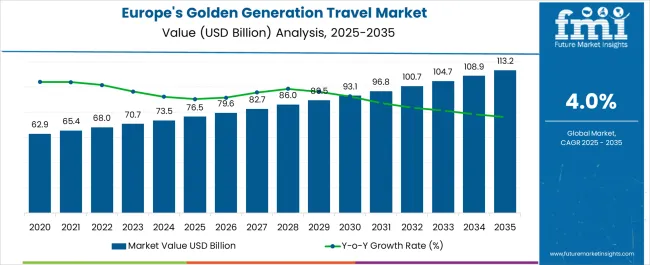
| Metric | Value |
|---|---|
| Europe's Golden Generation Travel Market Estimated Value in (2025 E) | USD 76.5 billion |
| Europe's Golden Generation Travel Market Forecast Value in (2035 F) | USD 113.2 billion |
| Forecast CAGR (2025 to 2035) | 4.0% |
The Europe’s Golden Generation travel market is gaining steady momentum, propelled by increasing life expectancy, strong retirement income security, and a cultural shift toward active and experiential aging. The demographic aged 60 and above is embracing leisure travel as a wellness and lifestyle extension, with preference for personalized, slower-paced itineraries rich in culture, history, and comfort.
Policymaker support through senior-centric travel schemes, enhanced mobility infrastructure, and accessible accommodation has expanded regional tourism accessibility. Moreover, digital adoption among older adults has improved significantly, with many engaging actively with online booking platforms and travel planning tools.
The market is poised for further growth, supported by rising health-conscious tourism offerings, heritage trail programs, and demand for intergenerational travel experiences. A stronger focus on value, safety, and familiarity is shaping product strategies, making Europe a core hub for senior-focused cultural and leisure tourism experiences.
The market is segmented by Tourism Type, Booking Channel, and Tourist Type and region. By Tourism Type, the market is divided into Cultural Tourism, Culinary Tourism, Sports Tourism, Spiritual Tourism, Medical Tourism, and Others. In terms of Booking Channel, the market is classified into Online Booking, Phone Booking, and In Person Booking. Based on Tourist Type, the market is segmented into Domestic and International. Regionally, the market is classified into North America, Latin America, Western Europe, Eastern Europe, Balkan & Baltic Countries, Russia & Belarus, Central Asia, East Asia, South Asia & Pacific, and the Middle East & Africa.
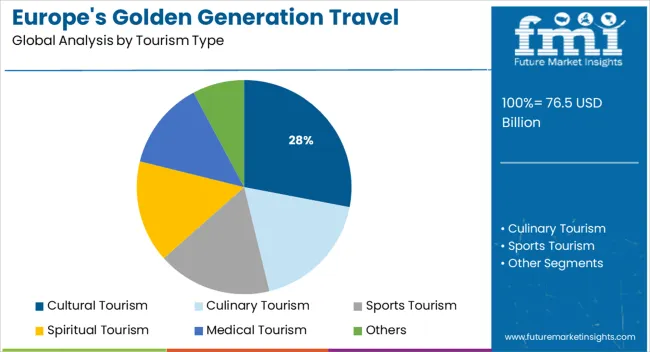
Cultural tourism is projected to contribute 28.0% of total market revenue by 2025, making it the most preferred tourism type among Europe’s golden generation travelers. This preference is being driven by an enduring interest in art, architecture, history, and tradition that aligns well with the slower, more reflective travel patterns of older adults.
The presence of UNESCO heritage sites, museum-rich cities, and classical music and art events across Europe has created a conducive environment for heritage-based itineraries. Tour operators have responded by curating destination packages that offer deeper engagement, multilingual guides, and inclusive transportation services.
The appeal of intellectual enrichment and authentic cultural immersion continues to draw mature travelers to this segment, reinforcing its lead in the market.
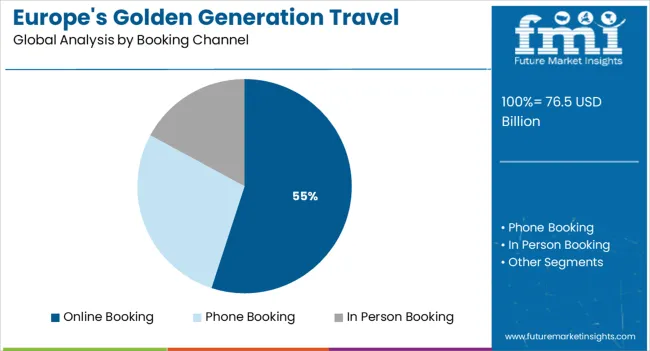
Online booking is expected to account for 55.0% of market revenue by 2025, establishing it as the leading booking channel. This growth is supported by increased digital literacy among older adults, the convenience of online customization, and real-time comparison tools that enhance planning confidence.
Simplified user interfaces, dedicated customer support, and secure payment options have built trust among senior users navigating digital travel platforms. Additionally, the rise of senior-focused online communities and travel forums is facilitating peer-driven recommendations and destination discovery.
Operators that provide mobile-accessible booking portals with senior discounts and accessibility information are witnessing higher engagement from this demographic. As confidence in digital channels increases, online booking is expected to remain dominant in capturing and converting golden generation travel demand.
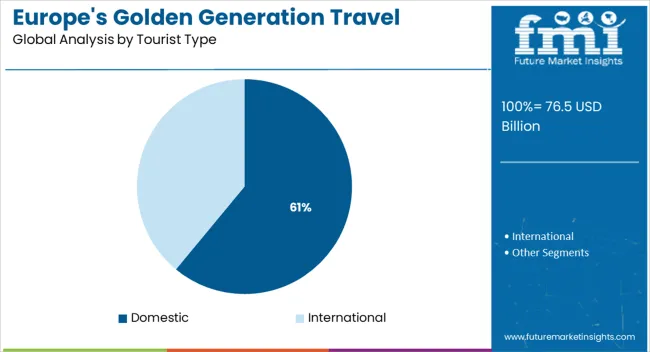
Domestic travel is expected to generate 61.0% of the Europe’s golden generation travel market revenue in 2025, making it the leading tourist type. This is being driven by factors such as ease of access, health security, shorter planning cycles, and stronger familiarity with domestic destinations.
Many senior travelers are opting for short-haul, comfort-first journeys that reduce logistical stress and support emotional connectivity to local heritage and culture. Government-sponsored travel incentives and regional tourism initiatives promoting intra-national travel among the elderly have also contributed to segment growth.
Furthermore, health infrastructure, language familiarity, and perceived safety are encouraging more frequent domestic trips. The appeal of rediscovering one’s own country in comfort and at a relaxed pace continues to position domestic travel as the preferred choice among Europe's aging population.
The tourist sector in Europe has recently undergone significant change. International tourism can be divided into two categories: inbound and outbound travel. These two types have a significant impact on the global tourism industry, not just in Europe.
The tourists may represent various age ranges, faiths, and mentalities. The age bracket of 55 and over is referred to as the Golden Generation. This group resembles older adults, retirees, and persons who are in their retirement period. When a person travels outside of his or her own nation, whether for pleasure or for business, that travel is referred to as outbound tourism.
Due to the expenditures made by the tourists, outbound tourism has an effect on the economy of a nation. The arrivals, overnight stays, and duration of stay of visitors have an impact on the statistics for outbound tourism. In the past, Europe's golden generation dominated nearly one-fourth of the entire European outbound market.
The golden generation traveled more frequently than people between the ages of 15 and 54. Some people might go on vacation to observe animals and birds and visit important historical sites, temples, or locations of tragic events that affected humanity. Others would travel to experience new cultures and ways of life.
Europeans over 60 find cruises to be quite appealing. Elderly passengers aboard the largest, most modern cruise ships, which are loaded with cutting-edge amenities for their age group. The towns and cities that can be visited, as well as the vistas that can be seen while on board, are absolutely incredible.
Compared to traditional vacations, cruises are significantly more stress-free and pleasant for seniors. Once they arrive on board, they can unpack in their accommodation and get comfortable for a few relaxing weeks. Everything you require is in one location. There will be dining establishments, stores, pubs, swimming pools, and recreational facilities on the cruise ship.
While aboard the cruise, all entertainment requirements are met. Some of the cruises even feature casinos for local gamblers. There is no need to plan trips or make travel arrangements. The average length of a cruise is three to four weeks. This implies that they will remain surrounded by the same individuals for a considerable amount of time.
Therefore, cruises are a fantastic method to meet new people. Cruises provide excellent financial value. Given that you go to so many different nations and far-flung locales, they can provide multiple vacations in one. Additionally, a lot of cruises offer everything you need at the price, including transfers, all-inclusive meals, and flights if necessary. Cruises make life easier for the elderly on holiday.
The technology utilised for travel purposes presents a barrier for older travellers. The tourist business has seen a profound transformation as a result of technological advancement in the previous two decades.
Information and communication technologies (ICTs), in particular, have been devised and deployed by businesses and stakeholders in the travel sector to enhance the travel experience. However, it could be difficult for older travellers to adjust to travel-related technologies.
Since travel and tourist activities by definition call for people to be removed from their customary surroundings and daily routines, seniors' use of technology when travelling may differ from their regular use, which could present problems for them.
Travel can enhance a senior's quality of life, and technology has also helped to make seniors more independent and self-assured as worries and expectations for a greater degree of life quality and total life satisfaction have continuously increased. However, travelling does provide unique environments and obstacles for elders. Using technology, particularly ICTs for travel, may or may not help to make travelling easier for seniors.
Senior tourism promotion is a tactic promoting active and healthy aging. Traveling actually gives individuals life happiness and keeps them active, prevents loneliness and a lack of purpose in later life, and addresses social isolation, some of the major problems older people experience today.
Traveling may be a rewarding experience for elderly folks since it offers a change from their daily routine and involves social interaction, environmental exploration, and encounters with other cultures.
AGE has joined Europe for a senior’s project, which aims to strengthen the European tourism industry with a focus on micro, small, and medium-sized businesses while also fostering senior citizens' active lives by involving them in tourism-related initiatives as both travelers and hosts of out-of-town guests.
The project's primary results will be the creation of senior-friendly vacation packages, a fresh and successful business and organizational structure for senior travel, the establishment of a scheme for Senior Tourism Quality Certification, a test run to confirm the project's results and collection data for the subsequent phase, a business plan for the implementation of the Europe for Seniors strategy over the medium term.
The project is built on a collaborative strategy of a public-private partnership that includes the entire community, involving institutions, the tourism-related business sector with a focus on micro and small, and medium institutions, Senior Associations, groups of interest, and non-profit organizations.
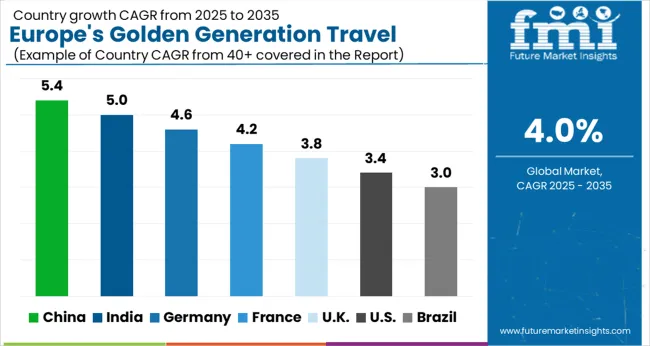
The Spanish government is aiming to aid the tourism sector by financially helping seniors on trips
The Spanish government is proposing active vacations during the winter in Spain, preparing a whole trip for which it will pay a portion of the cost, in an effort to make it as simple as possible for seniors from other EU nations to enjoy their free time. The main goal of this ground-breaking service is to provide seniors with options for vacations so they can make the most of their leisure time.
The various civilizations that coexist side by side in Europe can be brought closer together and learn more about one another through travel. Due to this, tours offered by Europe Senior Tourism are also included in efforts to develop the concept of citizenship in Europe.
One of the key objectives of the program is to address the industry's seasonal character, which is one of the major issues it faces. This method of reviving economic activity during the off-season in Spanish tourist spots, which are fully equipped to receive guests throughout the winter, has been developed by Europe Senior Tourism. Additionally, by actively promoting employment, will support the preservation and creation of jobs.
Romanians are focusing on the development of their wine
Wine is something that requires acquired taste and hence it is more popular amongst seniors who have decent knowledge about the flavors and aging of different wines. Romanians have identified this as an opportunity to attract seniors who travel mainly for the purpose of enjoying different cuisines in novel places.
The nation produces wine extremely differently and approaches wine production very differently, which should aid its burgeoning tourism industry. The wine industry is growing even though there aren't many tourists from abroad. Numerous wine regions are now ready to welcome visitors, and wine production is becoming more hygienic.
Another plus is that producers are emphasizing fine wines derived from local grape varieties. An influx of international chefs and sommeliers has also helped to improve the quality of the country's wine. If Romania's wine industry can get its wines in front of well-known wine experts, it may have a promising future, which is anticipated to benefit the country's tourism industry.
In-person is More Preferred by Tourists
In order to provide specific services to the age group over 50, travel agencies have stepped forward. These services are more specialized and provide a little extra attention for senior persons than they would typically for a younger age group. They go above and beyond the typical duties of handling passport and visa requirements, arranging airfare, hotels, and transportation arrangements to verify that your health is in good shape and is certified to endure the rigors of travel. Seniors find it difficult to book their tours online mode due to a lack of contact with emerging technologies. However, there is a fair share of golden generation travelers who are turning to websites and apps related to tourism for their trips.
International Tourists will account for a major share.
The senior population, in particular, has a higher spending capacity than younger individuals and those of other ages. Due to their increased ability to travel and spend money wherever they like, the tourist industry in Europe that caters to the golden generation is growing at a faster rate. People who are working and between the ages of 55 and 65 appear to be more active when it comes to business travel, which again helps the outbound travel market.
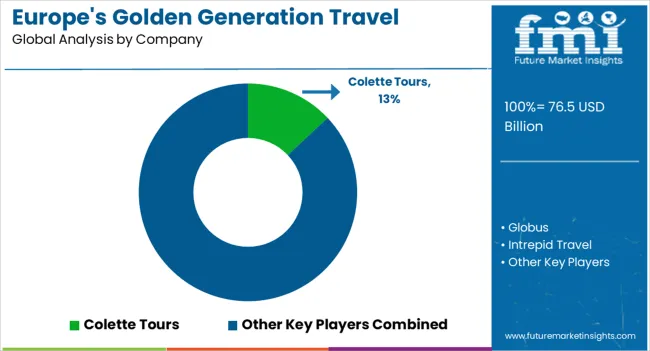
Tour firms tailored to senior travellers have sprouted up in Europe as a result of a rise in the number of travellers 65 and older. The sector has seen a number of trip operators for a while. They don't establish a minimum age requirement and make sure that seniors living with them can easily keep up with the pace.
Seniors can get hearing aids from some organisations, and elevators are standard in most hotels. Therefore, elderly folks are able to access hotel rooms and comprehend field instructions. Before leaving, travel plans are also planned. The budget will always be the same in this way.
For instance:
| Attribute | Details |
|---|---|
| Forecast Period | 2025 to 2035 |
| Historical Data Available for | 2020 to 2024 |
| Market Analysis | USD Billion for Value |
| Key Region Covered | Europe |
| Key Countries Covered | Austria, Belgium, Bulgaria, Croatia, Finland, France, Germany, Greece, Hungary, Ireland, Italy, Malta, Netherlands, Poland, Portugal, Spain, and Sweden. |
| Key Segments Covered | Tourism types, Booking Channel, Tourist Type, Tour Type. |
| Key Companies Profiled | Road Scholars; Globus; Intrepid Travel; Trafalgar; Smithsonian Journeys; Backroads; Overseas Adventure Travel; Elder Treks; Grand Circle Travel; Grand European Tours; Colette Tours |
| Report Coverage | Market Forecast, Company Share Analysis, Competition Intelligence, Drivers, Restraints, Opportunities and Threats Analysis, Market Dynamics and Challenges, and Strategic Growth Initiatives |
| Customization & Pricing | Available upon Request |
The global europe's golden generation travel market is estimated to be valued at USD 76.5 billion in 2025.
The market size for the europe's golden generation travel market is projected to reach USD 113.2 billion by 2035.
The europe's golden generation travel market is expected to grow at a 4.0% CAGR between 2025 and 2035.
The key product types in europe's golden generation travel market are cultural tourism, culinary tourism, sports tourism, spiritual tourism, medical tourism and others.
In terms of booking channel, online booking segment to command 55.0% share in the europe's golden generation travel market in 2025.






Our Research Products

The "Full Research Suite" delivers actionable market intel, deep dives on markets or technologies, so clients act faster, cut risk, and unlock growth.

The Leaderboard benchmarks and ranks top vendors, classifying them as Established Leaders, Leading Challengers, or Disruptors & Challengers.

Locates where complements amplify value and substitutes erode it, forecasting net impact by horizon

We deliver granular, decision-grade intel: market sizing, 5-year forecasts, pricing, adoption, usage, revenue, and operational KPIs—plus competitor tracking, regulation, and value chains—across 60 countries broadly.

Spot the shifts before they hit your P&L. We track inflection points, adoption curves, pricing moves, and ecosystem plays to show where demand is heading, why it is changing, and what to do next across high-growth markets and disruptive tech

Real-time reads of user behavior. We track shifting priorities, perceptions of today’s and next-gen services, and provider experience, then pace how fast tech moves from trial to adoption, blending buyer, consumer, and channel inputs with social signals (#WhySwitch, #UX).

Partner with our analyst team to build a custom report designed around your business priorities. From analysing market trends to assessing competitors or crafting bespoke datasets, we tailor insights to your needs.
Supplier Intelligence
Discovery & Profiling
Capacity & Footprint
Performance & Risk
Compliance & Governance
Commercial Readiness
Who Supplies Whom
Scorecards & Shortlists
Playbooks & Docs
Category Intelligence
Definition & Scope
Demand & Use Cases
Cost Drivers
Market Structure
Supply Chain Map
Trade & Policy
Operating Norms
Deliverables
Buyer Intelligence
Account Basics
Spend & Scope
Procurement Model
Vendor Requirements
Terms & Policies
Entry Strategy
Pain Points & Triggers
Outputs
Pricing Analysis
Benchmarks
Trends
Should-Cost
Indexation
Landed Cost
Commercial Terms
Deliverables
Brand Analysis
Positioning & Value Prop
Share & Presence
Customer Evidence
Go-to-Market
Digital & Reputation
Compliance & Trust
KPIs & Gaps
Outputs
Full Research Suite comprises of:
Market outlook & trends analysis
Interviews & case studies
Strategic recommendations
Vendor profiles & capabilities analysis
5-year forecasts
8 regions and 60+ country-level data splits
Market segment data splits
12 months of continuous data updates
DELIVERED AS:
PDF EXCEL ONLINE
Goldenseal Market
Travel Advertising Market Size and Share Forecast Outlook 2025 to 2035
Travel Pouches Market Size and Share Forecast Outlook 2025 to 2035
Travel Trailer Market Size and Share Forecast Outlook 2025 to 2035
Travel & Tourism User Generated Content Market Size and Share Forecast Outlook 2025 to 2035
Travel Bags Market Size and Share Forecast Outlook 2025 to 2035
Travel Vaccines Market Size and Share Forecast Outlook 2025 to 2035
Travel Accessories Market Analysis by Product Type, Material, Distribution Channel, End-User and Region 2025 to 2035
Travel Expenses Processing Market Analysis By Type, By End User, By Booking Channel, By Region Forecast: 2025 to 2035
Travel SIM MVNO Market by MVNO Type, Coverage, End User & Region Forecast till 2035
Understanding Market Share Trends in Travelers Identity Protection
Travelers Identity Protection Services Market Analysis by Service Type, by Subscription Model, by End User , by Nationality and by Region - Forecast for 2025 to 2035
Travelport GDS Systems Market Trends - Growth & Forecast 2025 to 2035
Travel Intermediaries Business Market Analysis - Growth & Forecast 2025 to 2035
Market Share Distribution Among Travel Agency Services Providers
Travel Agency Services Market Analysis by Services Provided, by Tourist Type, by Tour Type, by Demography, by Age Group and by Region– Forecast for 2025-2035
Travel Management Software Market
Travel Toiletry Market Report – Demand & Industry Growth 2024-2034
Travel and Expense Management Software Market
UK Travel Agency Services Market Report – Trends, Demand & Outlook 2025-2035

Thank you!
You will receive an email from our Business Development Manager. Please be sure to check your SPAM/JUNK folder too.
Chat With
MaRIA